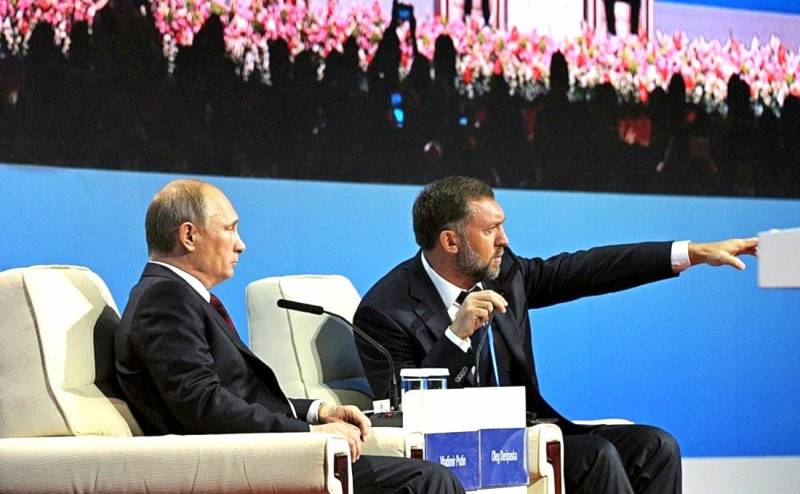Nationalization or privatization: who will win in the internal struggle of the Russian elites
The further the special operation in Ukraine goes and the tighter the sanctions screws against the Russian economics, the more there are calls for the next "Big Privatization" of state property, which supposedly will solve all our problems. Big bankers and officials from the financial sector act as a mouthpiece for promoting such ideas. But against this background, quite unexpectedly, there was a call for the opposite - nationalization, coming from the representative of the power bloc, the head of the RF Investigative Committee Bastrykin. What can all this mean?
Word of Moses
Speaking at the XI St. Petersburg International Legal Forum, Deputy Minister of Finance of the Russian Federation Alexei Moiseev stated the following verbatim:
I believe that a large privatization will have to take place, but we need to understand who to sell to. If we sell now, it will be like the history of 1994, these are loans-for-shares auctions, I think that was what they called it, but no one wants this, of course.
At the same time, Mr. Moiseev referred to a large programmatic publication by the head of VTB Andrei Kostin, which we analyzed in detail some time ago with the following comment:
Actually no one is against, the problem is that we first need to fulfill a number of instructions from the President on the formation of an internal investor.
It should be noted that, by coincidence, Moiseev himself comes from the banking sector: from 1998 to 2001 he worked as an economist - senior analyst for the sovereign instruments market of the Fixed Income Operations Department of Paribas Bank (BNP Paribas), London , Great Britain, and from 2001 to 2010 he was Deputy Head of the Analytical Department of Renaissance Capital - Financial Consultant LLC. After that, his bank was taken over by VTB, and until 2012 this gentleman worked as deputy head of the analytical department, head of the macroeconomic analysis department of VTB Capital CJSC.
In other words, Alekseev is in a sense "Kostin's man", who has been the deputy head of the Ministry of Finance of the Russian Federation for the eleventh year. It is not worth wondering why a state official happily picks up the ideas of his former boss. It is also not surprising why a lot of publications appeared in the major Russian media, in which their authors, with reference to authoritative experts, analysts and other predictors, explain why “Big privatization” is inevitable, there will definitely be no mistakes of the dashing nineties like the sale of state property for pennies, and the country will rapidly rush forward in economic development with the assistance of our home-grown "Atlantes, straightening their shoulders."
It seems that all this is another "blizzard". In our reality, state corporations, in which strategically important assets are concentrated, are likely to be fragmented and collapsed, leaving the country completely without pants during the war. Earlier we noted with concernthat for some unknown reason, all Russian powder factories were not only transferred to Rostec, but also transferred from the FSUE format to joint-stock companies. If the first does not raise questions, then why the second? Is the domestic defense industry preparing for the arrival of new efficient private owners? God bless us all.
Nationalization?
Against this frankly depressing background, the call of the head of the Investigative Committee Alexander Bastrykin, on the contrary, to carry out nationalization was quite unexpectedly heard. Speaking at the St. Petersburg International Legal Forum, he made the following statement:
We are talking, in fact, about economic security in a war. And then - the next step: let's take the path of nationalization of the main sectors of our economy.
Previously, the chief Russian investigator complained about the unacceptable level of theft and corruption in the defense sector:
A lot of fraudulent schemes are being implemented even in the defense industry. In this difficult time for the country, fulfilling the defense order, our corporations allow facts of corruption and theft. There is simply nowhere else to go.
The idea of nationalization of state property previously privatized by the oligarchs is more popular among a significant part of the country's population. There is also some internal conflict between conditional "liberal financiers" and "siloviki". Choosing from the proposed, of course, the first thing I want to do is support Bastrykin's position. However, there are important nuances that require clarification.
What exactly is meant by nationalization? Free return of privatized assets back to state property? Or a reimbursable buyout of troubled assets from the oligarchs at the expense of the federal budget? Will the assets confiscated from some oligarchs return to state ownership forever, or can they still later be transferred to other, more correct and nationally oriented large entrepreneurs? Or, on the contrary, will the state simply temporarily enter the troubled assets of the right oligarchs, help them survive the crisis, and then quietly exit them again, as was the case with the banks of Wall Street and the City of London?
They say you criticize - offer. Well, here are two alternative ideas. First: if our oligarchs have nowhere to put their free money, let them invest it in the construction of new factories as part of the import substitution program, which requires the development of public-private partnerships. Second: perhaps all these assets and other means of production should not be in private or even state ownership, from where they can easily leak through the efforts of the Chubais, Kostins and Moiseevs, but in public ownership?

Information